#dress code for women in islam
Explore tagged Tumblr posts
Text
3 Reasons Women Should do Charity
The Prophet Muhammad (ﷺ) once addressed a group of women and encouraged them to give charity. He said that he had seen that most of the people in Hell were women. The women asked why this was so. Why Women Should Be Mindful Women often curse and are ungrateful to their husbands. Women can be led astray easily. Women have some deficiencies in their intelligence and religion. What Are These…
View On WordPress
#ablution in islam women#anwarul islam women&039;s arabic college mongam#are men and women equal in islam#are women allowed to work in islam#beauty of islam women#best women in islam#brave women in islam#british women convert to islam#can men and women just be friends islam#can women do business in islam#can women drive in islam#can women fast during periods in islam#can women remove body hair in islam#can women shave their face in islam#can women use razor in islam#can women wear jeans in islam#can women work in islam#convert to islam women#divorce in islam women#dress code for women in islam#great women of islam book#hadith about women#how do women pray in islam#how to pray correctly islam women#islam about women job#islam beautiful women#islam for beginners women#islam woman convert#islam woman documentary#islam women
0 notes
Text
The wedding was finally over and Ömer and Meryem retired to their homes. They had both ditched the traditional robes for the wedding and ended up in comfortable pajamas.
When Ömer entered the bedroom, Meryem fascinated him. For the first time, she was without a hijab and her hair was let down,that is as black as night and almost down to her waist.
He couldn't take his eyes off Meryem. He had always found her beautiful, but she seemed even more beautiful now.
Meanwhile, Meryem looked up from the book she was reading and finally noticed Ömer.
The fascination in his gaze (yes, bro was fascinated by his wife's beauty) did not escape her, he couldn't hide it either.
“I always knew that Meryem was beautiful in every way... But my God this time... She looks very differently beautiful now…” He thought as he looked at her lovingly.
"Is something wrong, Ömer?It's like you got distracted?"
"Oh? No,no... Nothing’s wrong, sevgilim (my love)...It's just...I'm.. Captivated by your beauty and was admiring you…”
"I still can't believe we're married..." He said softly while lying down. Meryem giggled softly and kissed Ömer on the forehead before leaning down.
"I share your feelings…It’s sounds so surreal right now.”
Before Meryem slowly lay down on Ömer, she looked at him with a soft smile, as if asking permission for something. The two smiled in response to each other, and when she lay on top of her, he wrapped his arms around her.
"I'm happy to have you as my wife tho..."
"And I'm happy to have you as my husband…”
Before getting married, Ömer thought that his first night with Meryem would be very tense and that sharing the same bed with her would be uncomfortable for him at first.
Meryem, unlike him, did not seem very worried, she was quite comfortable sleeping in the same bed with him, being closer to him than the two of them normally were, as if she had been waiting for this moment for a long time.
He couldn't help but feel a little jealous of her comfort and he wished that he could be at least a little bit as comfortable as she was.
But now, he felt too tired to overthink and as if he had forgotten all this, he fell asleep embracing,being enterweined with Meryem.
#My ocs#my writing#story time#oc fic#Oc: Ömer Polat#Oc: Meryem Alptekin#Ship name: Polattekin#A little context: Ömer and Meryem are religious Muslims.#And Meryem is a hijabi Muslim (a Muslim woman who complies to Islamic women's dress code).#Therefore in Islam#It is forbidden for a man who is not a relative (such as father or brother) to see a woman without her hijab.#Since Ömer is now Meryem's husband he now has the privilige to see her without her hijab.#Polattekin is basically a non necessary drama free Oplita.
1 note
·
View note
Text
How does the Iranian government justify its policies on morality and women's dress codes?
The Iranian government’s policies regarding morality and women’s dress codes have been a subject of debate and scrutiny in recent years. These policies, often enforced through the imposition of strict guidelines on public attire, are justified by the government on various grounds. One of the main justifications put forth by the Iranian government is based on the preservation of Islamic values…
View On WordPress
0 notes
Text
saying F U to the regime again and again: a quick update on women vs IR regime
Famous Iranian actresses have been appearing in public without a mandatory hijab. This has been happening since the beginning of the protests. Last month, Kiumars Pourahmad, a well known Iranian screenwriter and director, committed suicide. He had a history of criticizing the regime's political decisions. At his funeral, some of the famous actresses attended without mandatory hijab.
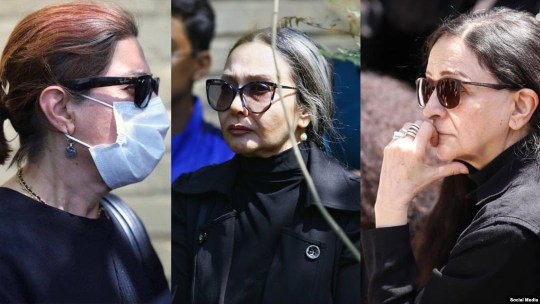
You can see Fateme Motamedarya, Katayoun Riyahi, and Golab Adineh in these pictures from the funeral. Ms. Riyahi was one of the first celebrities who took her hijab off at the start of the Jina (Mahsa) Amini protest and for that she's been the target of IRGC harassment and has been to court.
Last week, in the ceremony of screening of the final episode of Lion's Skin (a persian crime show), actress Pantea Bahram participated without hijab. The manager of Tehran’s Lotus Cinema, where the ceremony was held, was fired for letting her attend without hijab.
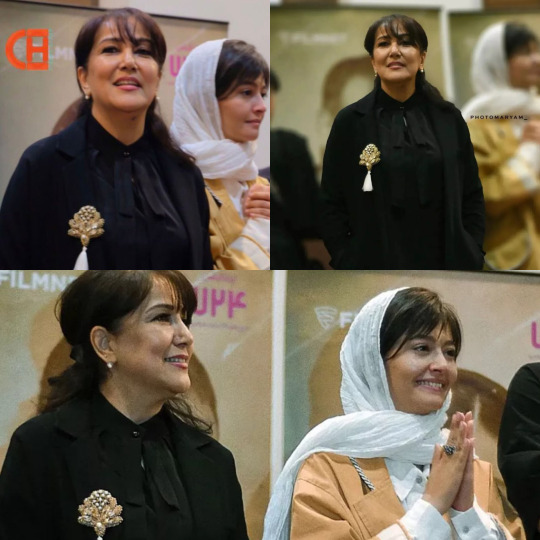
Other than prosecution, the regime has blocked these celebrities' bank accounts. Basij and IRGC members have also attacked and harassed these women online and in real life.
Students on university campuses take off their hijabs. There's an installed version of morality police in universities that monitor students' styles. Female students must wear "appropriate" hijab and male students must wear "manly" clothes (one of my guy friends once was asked to go back home and change his shoes because they were red casual loafers. Apparently that's gay!). When you enroll in Iranian universities, the first thing you do is to go to the security office and sign an agreement that says you promise to follow the Islamic dress code. There are posters all over the campus that says things like "hijab is security" "respect the islamic hijab" and "not wearing appropriate hijab (tight short clothes, too much hair, makeup, etc) would result in legal action". So not wearing hijab on campus, where a lot of security cameras are installed and it's easy to identify you, is a big deal.
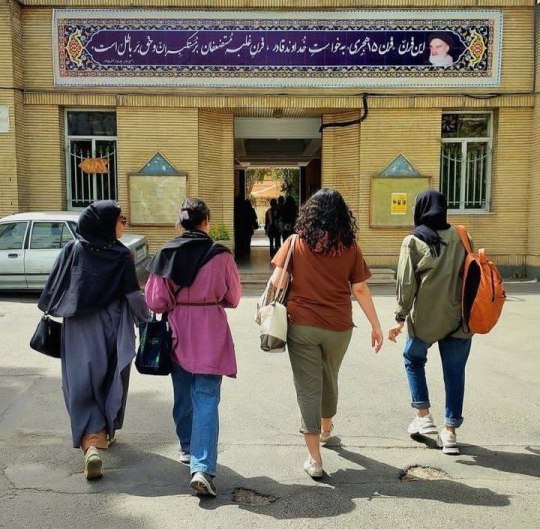
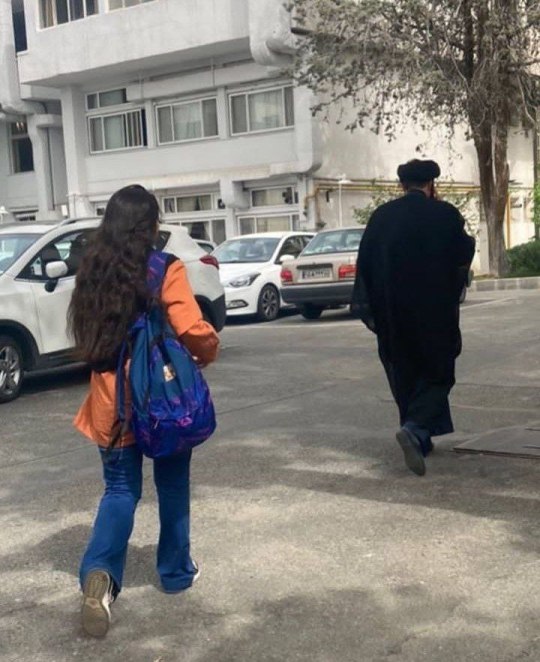
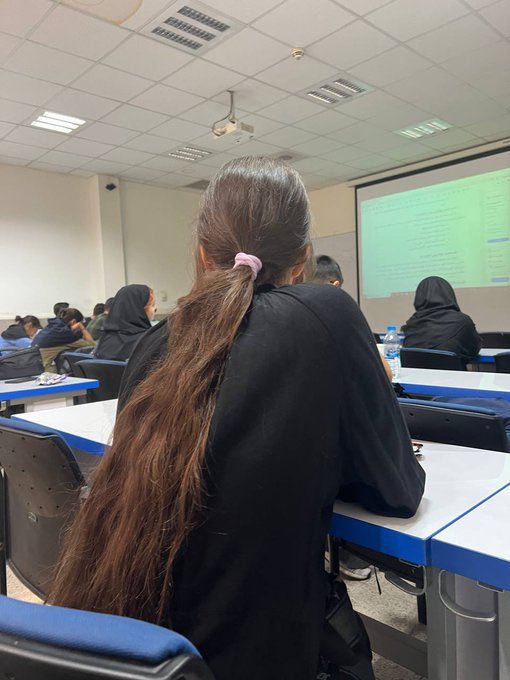
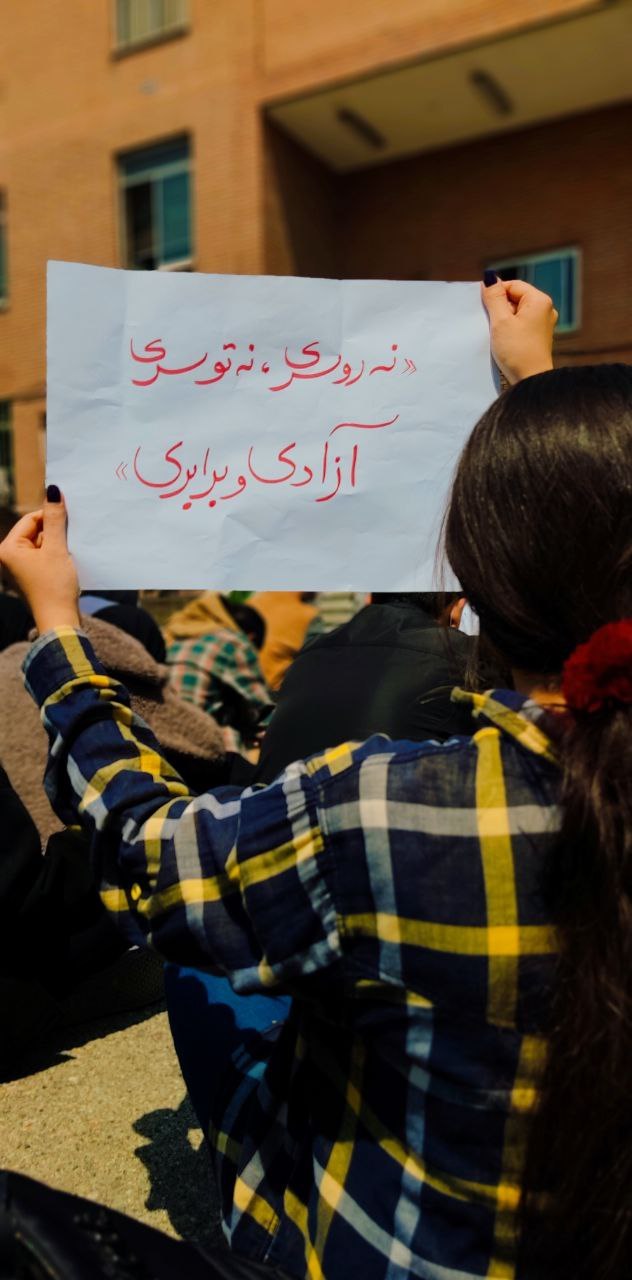
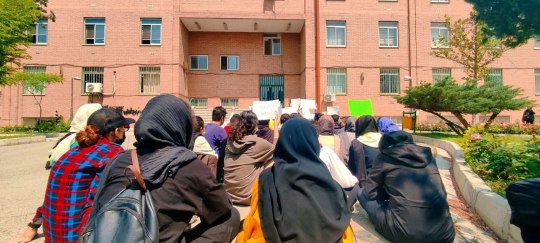
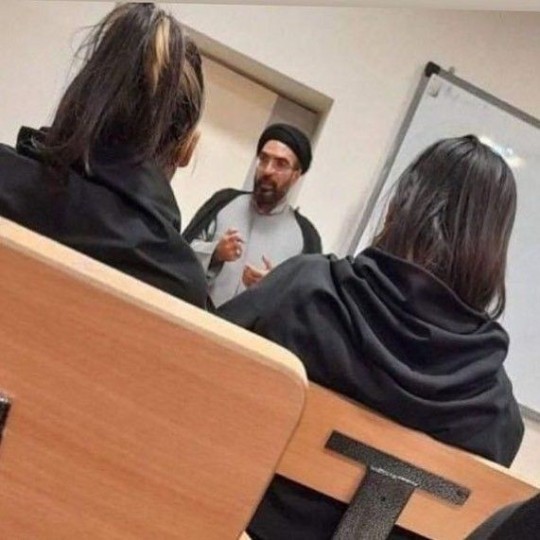
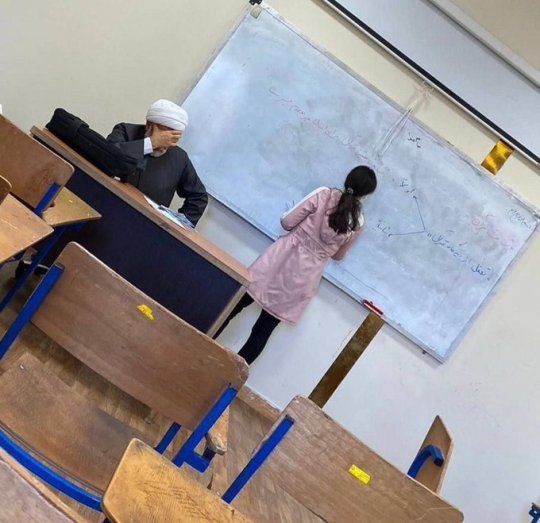
The regime's response to students taking off their hijabs is sending threatening messages to students' phones and increasing the security people. At the entrance of Universities, these security forces check people's clothes and if it's not proper they won't let you in. Some of the students wear the hijab at the entrance and take it off after they're in. They have warned our professors to not let non hijabi students sit in classes too.
One of my favorite trends in Iran now is when guys wear our hijab. These pictures are from universities. Guys wearing hijab make the security mad. This is a great act of solidarity with women against the obligatory hijab.
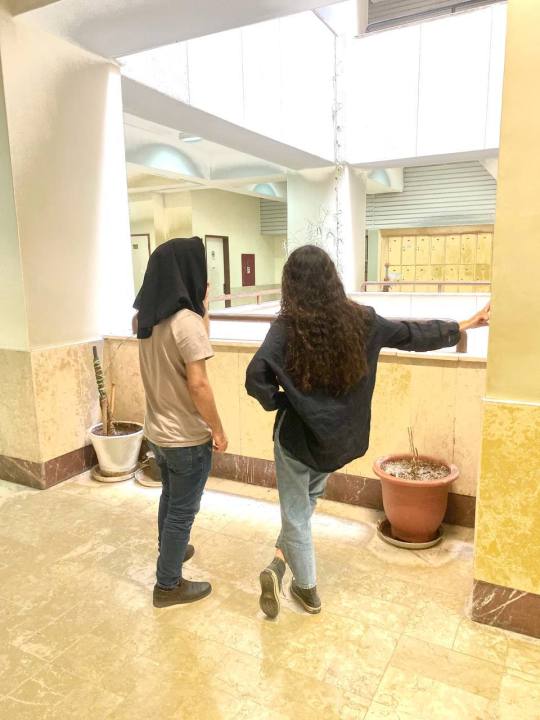
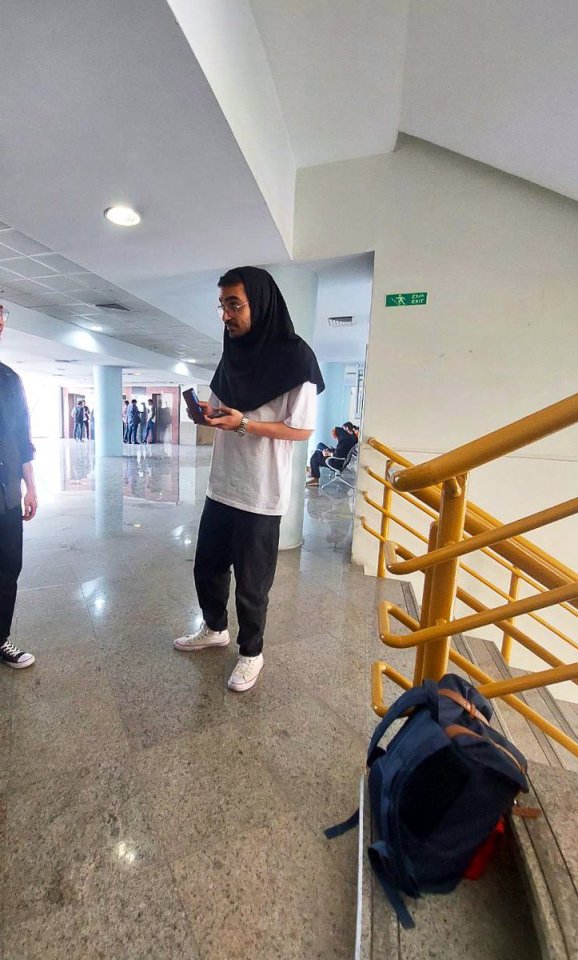
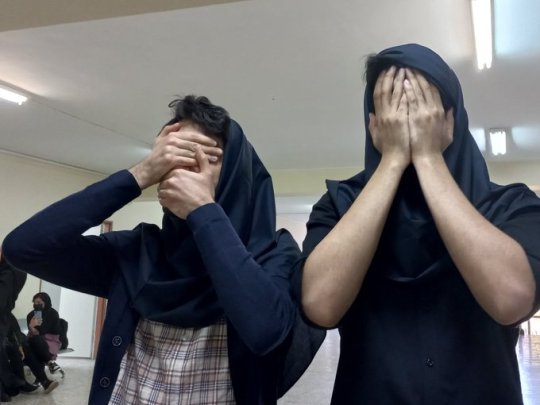
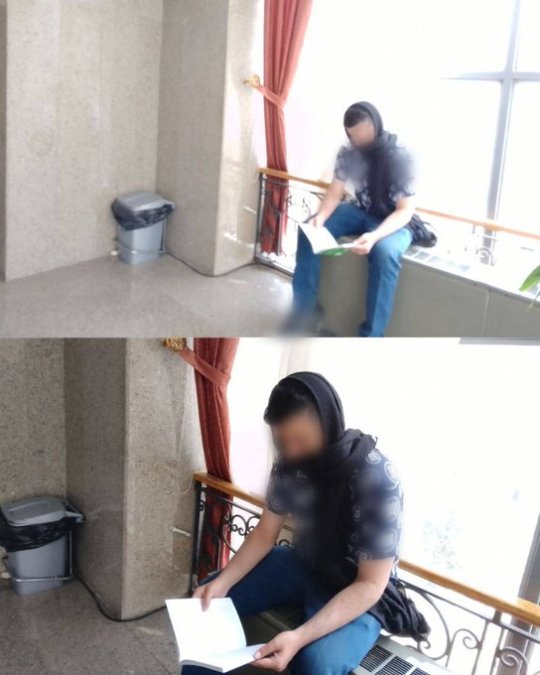
Some men have been doing either this or wearing shorts in public. The former is to ridicule the obligatory dress code and the latter is because wearing shorts in public is forbidden for guys too.
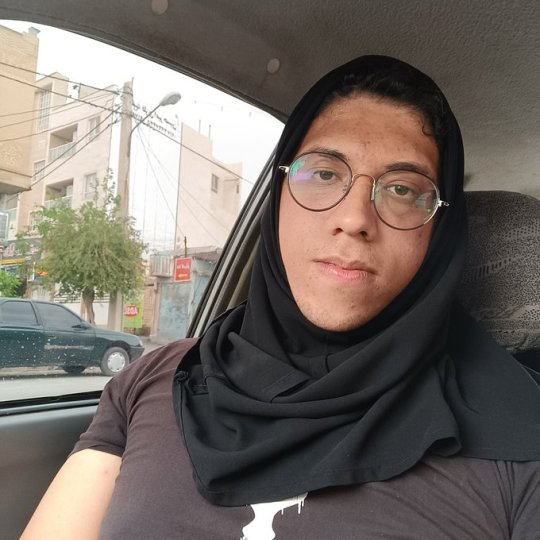
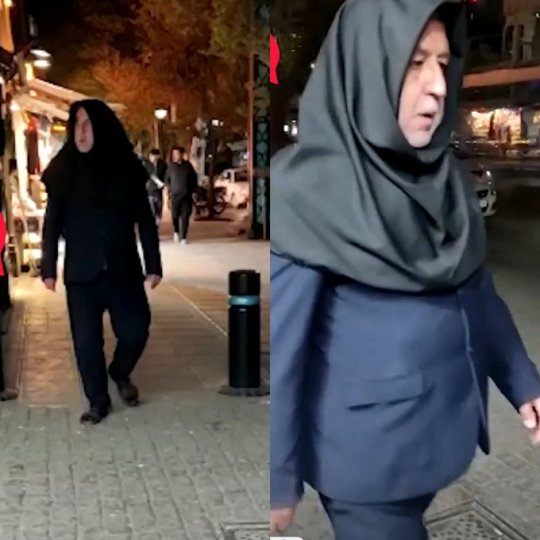
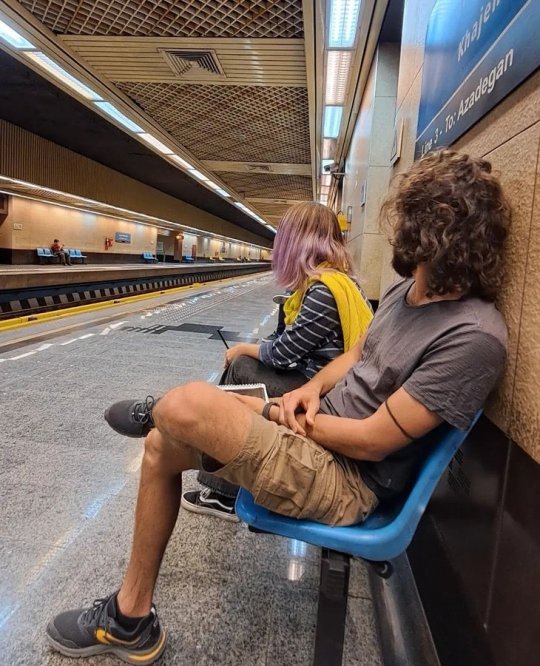
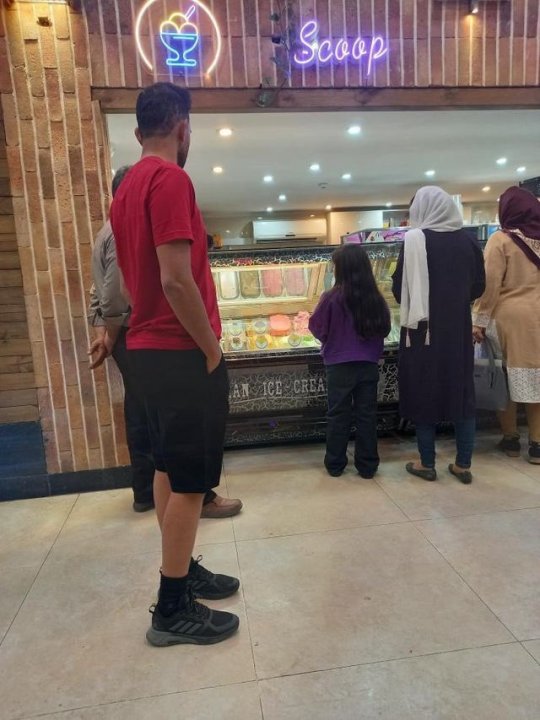
And women not wearing hijab in general. Though hijab is not our only issue, we want a whole new political system, one that is not theocratic or terroristic, hijab is something the regime won't back down from because it's one of their strongest oppressing tools. If they let us win the fight against obligatory hijab, I quote from a regime head, "people keep demanding more changes"!
So to put people against people to enforce the hijab law again, the regime has closed down many businesses (hotels, cafes, malls, bookstores, etc) for welcoming non hijabi female costumers. They have also warned taxi and bus drivers to not let non hijabi women in their vehicles.
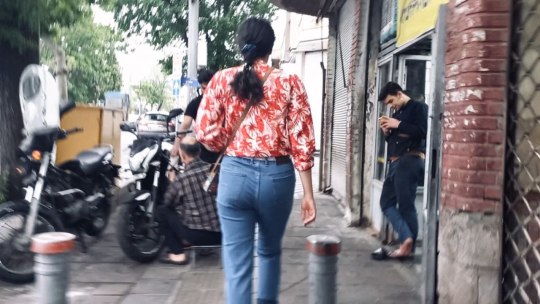
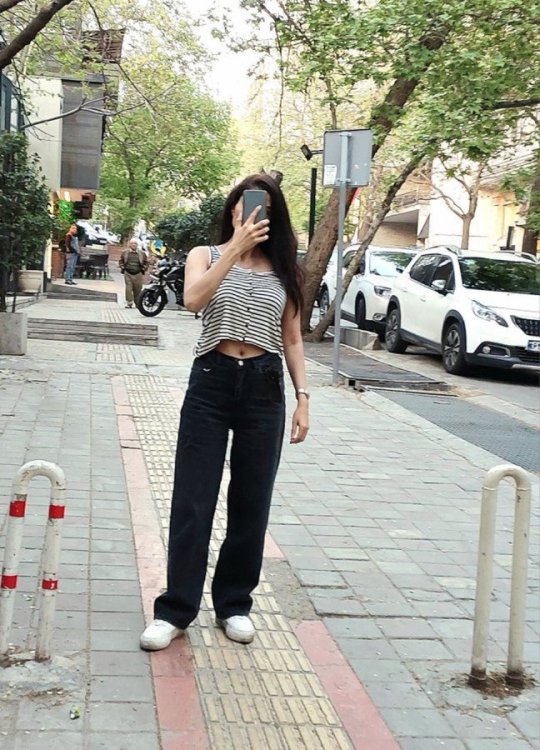
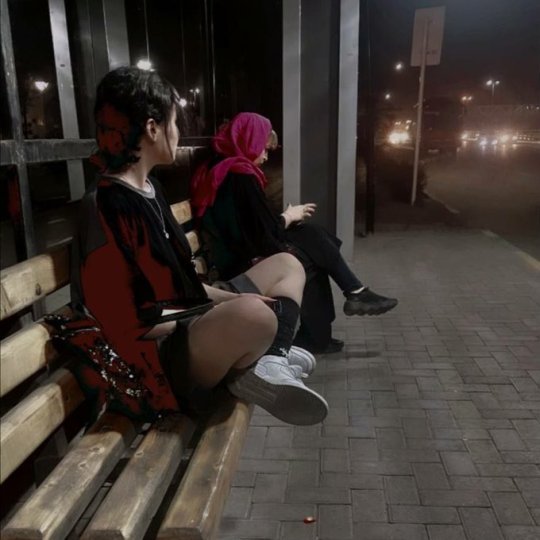
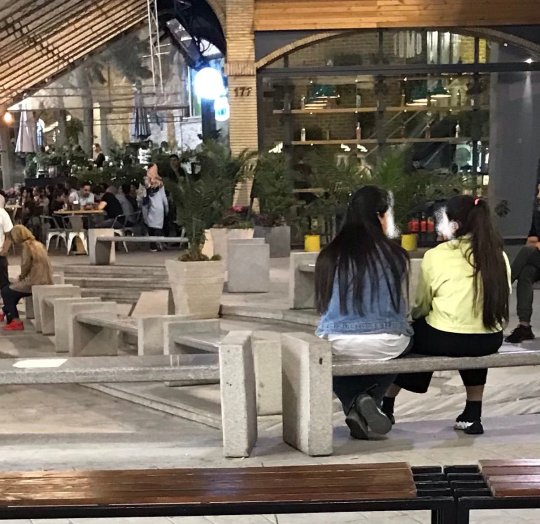
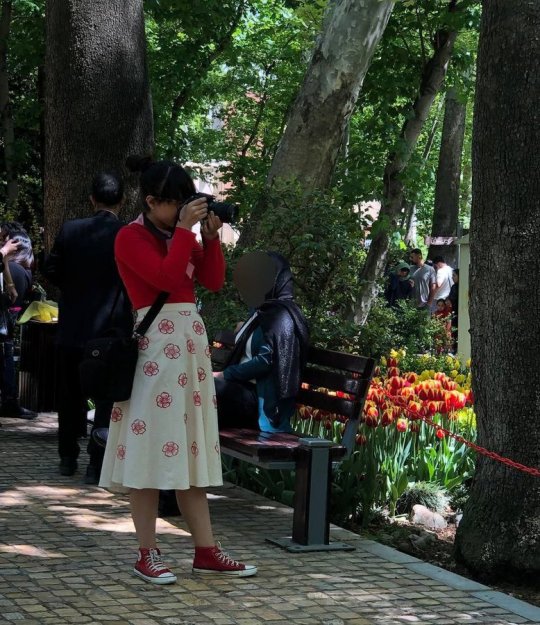
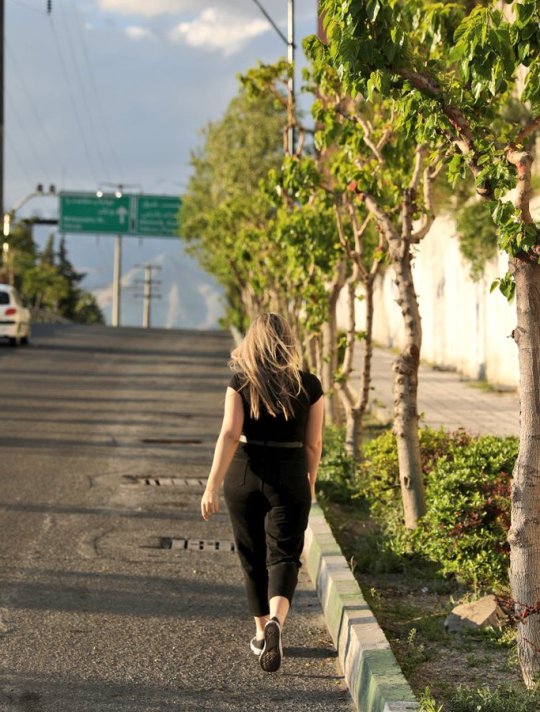
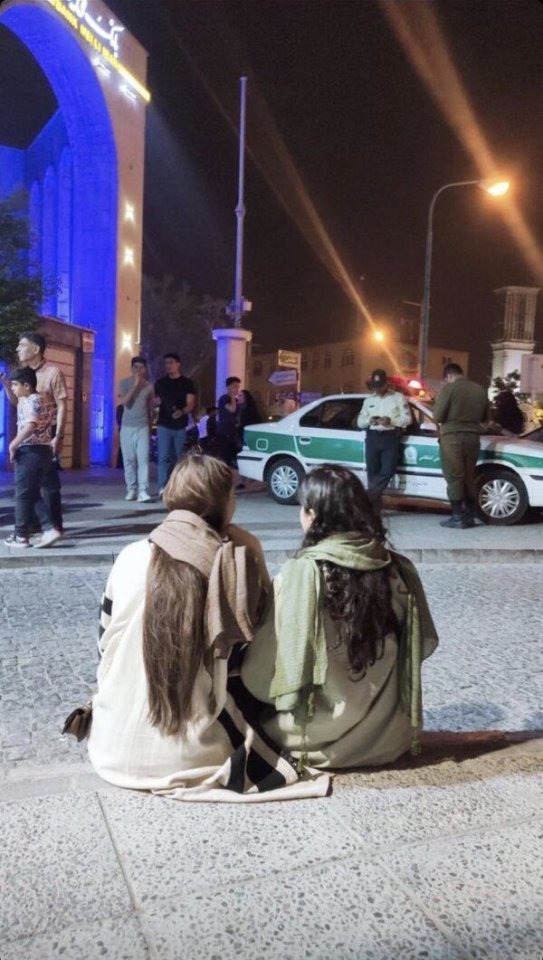
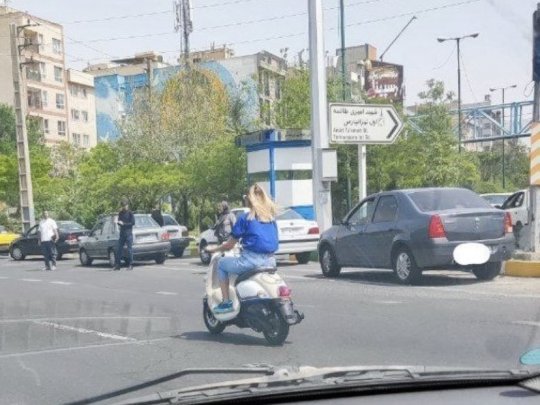
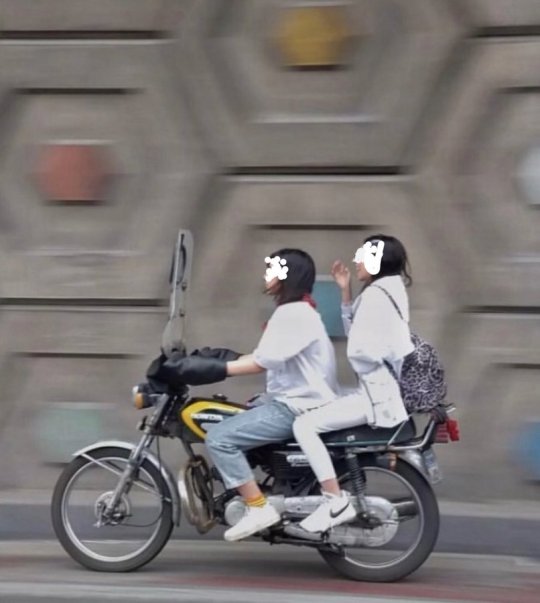
Although not everyone is disobeying the hijab law (some believe in hijab, some don't want to pay the price), the number of women who take the risk and don't wear hijab in Tehran and many other cities is high enough that you feel encouraged to keep doing it.
#iran#iran protests#iran revolution#mahsa amini#jina amini#jin jiyan azadi#women life freedom#politics#human rights#feminism#middle east#women revolution#obligatory hijab#university student#civil disobedience
2K notes
·
View notes
Text
something I also appreciate is the characterization of Noor and how she was portrayed as being judgmental without being a religious extremist. Her (and her friends by extension) are preppy, but full loose coverage is not part of their dress code. It’s a small detail but it makes such a large difference in how they’re characterized- yes, Noor criticizes Amina’s clothing, but not for it being somehow not Muslim. Noor herself wears half sleeves, turban style hijabs, makeup and jewelry. She’s not trying to make Amina dress “more Muslim”, she’s trying to stop Amina from standing out. with her redemption arc in season two, it becomes a lot more evident that she is struggling with a lot of internalized shame and it’s so beautiful to me that she explores that in a scene with exclusively other Muslim women. purity culture is the problem Noor struggles with, not Islam. shame and criticism is what drives a wedge in between Noor and Amina, not Noor’s expression of faith. you don’t get that nuance without a Muslim writer in the room, imho
215 notes
·
View notes
Text
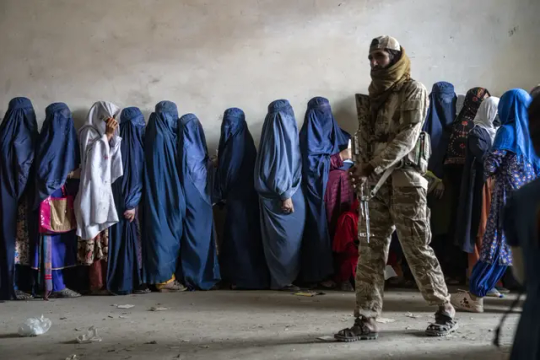
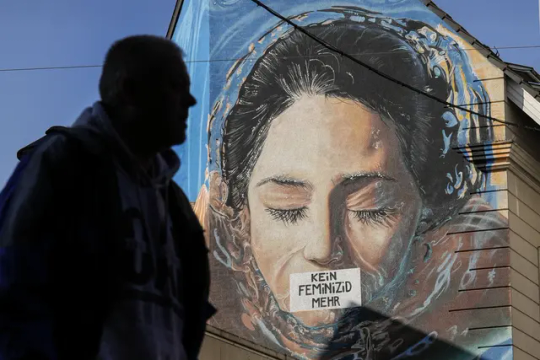
By EDITH M. LEDERER Updated 9:11 PM PST, March 8, 2024 UNITED NATIONS (AP) — Legal equality for women could take centuries as the fight for gender equality is becoming an uphill struggle against widespread discrimination and gross human human rights abuses, the United Nations chief said on International Women’s Day. Secretary-General Antonio Guterres told a packed U.N. commemoration Friday that “a global backlash against women’s rights is threatening, and in some cases reversing, progress in developing and developed countries alike.” The most egregious example is in Afghanistan, he said, where the ruling Taliban have barred girls from education beyond sixth grade, from employment outside the home, and from most public spaces, including parks and hair salons. At the current rate of change, legal equality for women could take 300 years to achieve and so could ending child marriage, he said. Guterres pointed to “a persistent epidemic of gender-based violence,” a gender pay gap of at least 20%, and the underrepresentation of women in politics. He cited September’s annual gathering of world leaders at the U.N. General Assembly, where just 12% of the speakers were women. “And the global crises we face are hitting women and girls hardest — from poverty and hunger to climate disasters, war and terror,” the secretary-general said. In the past year, Guterres said, there have been testimonies of rape and trafficking in Sudan, and in Gaza women women and children account for a majority of the more than 30,000 Palestinians reported killed in the Israeli-Hamas conflict, according to the Gaza Ministry of Health. He cited a report Monday by the U.N. envoy focusing on sexual violence in conflict that concluded there are “reasonable grounds” to believe Hamas committed rape, “sexualized torture” and other cruel and inhumane treatment of women during its surprise attack in southern Israel on Oct. 7. He also pointed to reports of sexual violence against Palestinians detained by Israel. International Women’s Day grew out of labor movements in North America and across Europe at the turn of the 20th century and was officially recognized by the United Nations in 1977. This year’s theme is investing in women and girls to accelerate progress toward equality. Roza Otunbayeva, the head of the U.N. political mission in Afghanistan, told the Security Council on Wednesday that what is happening in that country “is precisely the opposite” of investing in women and girls. There is “a deliberate disinvestment that is both harsh and unsustainable,” she said, saying the Taliban’s crackdown on women and girls has caused “immense harm to mental and physical health, and livelihoods.” Recent detentions of women and girls for alleged violations of the Islamic dress code “were a further violation of human rights, and carry enormous stigma for women and girls,” she said. It has had “a chilling effect among the wider female population, many of whom are now afraid to move in public,” she said. Otunbayeva again called on the Taliban to reverse the restrictions, warning that the longer they remain, “the more damage will be done.” Sima Bahous, the head of UN Women, the agency promoting gender equality and women’s rights, told the commemoration that International Women’s Day “sees a world hobbled by confrontation, fragmentation, fear and most of all inequality.” “Poverty has a female face,” she said. “One in every 10 women in the world lives in extreme poverty.” Men not only dominate the halls of power but they “own $105 trillion more wealth than women,” she said. Bahous said well-resourced and powerful opponents of gender equality are pushing back against progress. The opposition is being fueled by anti-gender movements, foes of democracy, restricted civic space and “a breakdown of trust between people and state, and regressive policies and legislation,” she said. [Click on the link to continue reading]
#women's rights#femicide#taliban#women's oppression#international women's day#global feminism#feminism
316 notes
·
View notes
Text
After widespread outcry last year, the Iranian authorities said they would suspend enforcement of the new, strict, hijab laws, which impose draconian penalties – including fines and prison sentences – on women found in breach of the mandatory dress code.
Yet women in Iran are reporting that state surveillance has been steadily increasing.
Last week, the UN’s fact-finding mission reported on Iran’s increasing reliance on digital surveillance such as its Nazer mobile application, a state-backed reporting platform that allows citizens and police to report women for alleged violations.
The app is accessible only via Iran’s state-controlled National Information Network. Members of the public can apply to become “hijab monitors” to get the app and begin filing reports, which are then passed to the police.
According to the UN mission, the app has recently been expanded to allow users to upload the time, location and licence plate of a car in which a woman has been seen without a hijab.
It can also now be used to report women for hijab violations on public transport, in taxis and even in ambulances.
According to the UN report, aerial surveillance using drones has also been used at events such as the Tehran international book fair and on the island of Kish, a tourist destination, to identify women not complying with the hijab law.
The government has also increased online monitoring, blocking women’s Instagram accounts for non-compliance of hijab laws, and issuing warnings via text message. CCTV surveillance and facial-recognition technology has also been installed at universities. “This ‘digital repression’ is not only stifling academic freedom but also causing increased psychological stress among students,” says a spokesperson for the Amirkabir Newsletter, an Iranian student media group.
Last July Arezoo Badri, a 31-year-old mother of two, was shot and paralysed when a police officer opened fire on her vehicle in Noor city, Mazandaran province, after her car was reportedly flagged for a hijab violation.
13 notes
·
View notes
Text
Religious terrorism !! And, yes my fellow Americans, we are already there.
16 notes
·
View notes
Text
Afghan women are forbidden from praying loudly or reciting the Quran in front of other women, according to a Taliban government minister.
It’s the latest restriction on women following morality laws that ban them from raising their voice and baring their faces outside the home. They are already excluded from education after sixth grade, many public spaces and most jobs.
Nobody from the Vice and Virtue Ministry was immediately available Wednesday to clarify the official’s remarks or confirm if the prohibition would also become part of the morality laws.
During an event in eastern Logar province on Sunday, Vice and Virtue Minister Khalid Hanafi said: “It is prohibited for a grown woman to recite Quranic verses or perform recitations in front of another grown woman. Even chants of takbir (Allahu Akbar) are not permitted.”
He said that uttering similar expressions like “subhanallah,” another word central to the Islamic faith, was also not allowed. A woman was not permitted to perform the call to prayer, he told the gathering. “So, there is certainly no permission for singing.”
Audio of Hanafi’s remarks was shared on the ministry’s social media platforms but was later deleted.
The ministry said Tuesday that a nationwide awareness program about the laws is underway involving ministry officials at provincial and district levels.
“Organizing such programs will contribute to shaping public perception and increasing awareness of divine rulings,” the ministry added.
Afghan provinces are already barring the media from showing images of living things, another controversial and widely criticized feature of the morality laws.
The Taliban set up the ministry for the “propagation of virtue and the prevention of vice” after seizing power in 2021.
Since then, the ministry has enforced decrees issued by the Taliban leadership that have a disproportionate impact on women and girls, like dress codes, segregated education and employment, and having a male guardian when they travel.
#nunyas news#these guys are almost making iran look progressive#if only there had been some kind of agreement#that would have kept them from being able to do this#on paper at least
21 notes
·
View notes
Text
8 notes
·
View notes
Text
I’m a musician who played on Bourbon street on New Year’s Eve. Here’s what I have to say about the republican politicians trying to score points at the expense of all the people around me that night.
Every act of terrorism is inherently political. And since the right wing power structure in charge of this country is rushing in to speak on behalf of me and my friends and coworkers—the folks who work on bourbon street and have to deal with the aftermath of this attack—I’m going to speak out too. If you feel it’s crass to “politicize” this, remember, the terrorists and the politicians already have, so why not hear from an actual musician who was actually working that night on bourbon street.
When the people in power impose their moral code on the populace using violence. Weather it’s the cops attacking random black men during traffic stops, or the military of an apartheid state bombing civilians, or the oligarchs in control of a private prison system filling their jails to capacity. It’s called state-violence, and it’s legal. When people who are not in power use violence against random civilians to impose their own morals it’s called terrorism.
The only things that differentiates a Jihadist attacking bourbon street, from a military drone bombing civilians or a policeman beating a handcuffed man to death is the flag they waive. Whether the flag has an isis insignia, a Star of David or a thin blue line makes no difference to the victims. To kill civilians at random is an act of terror. To collectively punish the people is a war crime. These people are all the same. The terrorist, the conservative senator and the billionaire all believe you should be forced to do as they say and if you resist you should be punished with violence.
That’s why the gauntlet of conservative politicians using this attack to their own ends makes my blood boil. The beliefs of an average Republican senator today are barely different from the Islamic fundamentalists commuting mass murder. The state government that bans pornography for religious reasons, that forces their own religious iconography in schools, that makes divorce illegal, that arrests women for the way they dress, that arrests women for having an abortion when the pregnancy will kill them, or when the mother is 12 years old—has more in common with ISIS than they do with you or me.
The conservative politician’s psychopathic need to force their particular interpretation of their particular religion on us is exactly the same need as Isis. Which sect of which religion they impose hardly maters. The only functional difference is that the conservative power brokers that run our country have the law and the police on their side.
So to Trump and Landry and the slew of right wing demagogs trying to profit from the death and suffering on New Years, I’m telling you from the bottom of my heart, you are the same as the terrorists. Your psychotic need to impose your beliefs, and your willingness to use violence on innocent people to do so, puts you squarely in the company of all the other terrorists. Your views on women’s rights and religious freedom are barely different than ISIS. Through the policies you’ve imposed you’re already responsible for more deaths than the shooter. You are bad people to the core not just for using these deaths to your own advantage but because your beliefs and desires are barely different than the terrorist that committed them.
New Orleans is the freeist city I’ve ever lived in, in the least free state. The Louisiana government is controlled by religious extremists imposing their religious doctrines by force. These people are not like us. Senator Mike Johnson has an app on his phone designed for evangelical fundamentalists that alerts him if his son masturbates. JD Vance is an avowed Christian Nationalist who’s stated goal of making America a Christian Nation means forcing the country’s laws to abide by HIS interpretation of HIS sect of HIS religion, which means everything from no drinking on Sunday to making porn illegal to re-criminalizing marijuanna to forcing doctors to let woman die rather than perform abortions.
The same reason the Isis inspired terrorist chose the French quarter of New Orleans as a target—the debauchery, the decadence, the partying and music and joie de vivre that the city is known for, is exactly what the conservative terrorists that control our legislature hate about the city. The only point of contention the Republican dominated government and the Isis inspired terrorist have with one another is which sect of which religion gets to impose its totalitarian ideals on the rest of us. Jihadism is already here, it’s just called Christian Nationalism. Sharia law is already here it’s just called Project 2025.
12 notes
·
View notes
Text

In Iran, a female student has reportedly stripped down to her underwear in protest after a confrontation with security officers.
Amnesty Iran appeals to Iran’s authorities to immediately & unconditionally release the university student who was violently arrested on 2 Nov after she removed her clothes in protest against abusive enforcement of compulsory veiling by security officials at Tehran's Islamic Azad University.
The woman was able to walk around for a few minutes before being dragged into a van and taken away.
Strict dress codes apply in the Islamic Republic of Iran, which are increasingly being ignored by the younger generation. Compliance with them is also monitored by so-called morality watchdogs. Since the nationwide protests in autumn 2022, for example, many women in the major cities have been resisting the headscarf requirement.
https://x.com/AmnestyIran/status/1852759513494909228

#human rights#class war#iranian#iran news#free iran#iran#ausgov#politas#australia#amnesty international#amnesty#Tehran#university#universities#auspol#tasgov#taspol#fuck neoliberals#neoliberal capitalism#anthony albanese#albanese government
10 notes
·
View notes
Text
As Shadi prepares to become a mother for the first time, the Iranian 30-year-old is so concerned about her unborn daughter’s future that she is considering leaving her homeland.
“The challenges and inequality we face as women start from birth,” said Shadi, a housewife in Tehran, who did not give her full name for fear of persecution. “The hijab is imposed on girls from a young age, restricting their freedom in society and affecting how they grow up as well as their opportunities in life,” she added.
Iran has imposed a strict dress code on women since a revolution swept the ruling Islamic regime into power 45 years ago, obliging them to cover their hair and wear loose-fitting clothes. Authorities have stepped up enforcement of the rules since the death of Mahsa Amini in police custody in September 2022 triggered major protests across the country, during which women openly flouted the code. Last year, Iran’s parliament approved a bill to strengthen punishments for such violations.
Although the protests have subsided, the hijab has been a prominent issue ahead of the elections that will occur on the first day of March for Iran’s parliament and the executive council that appoints the country’s supreme leader. Turnout is expected to be low, with young voters particularly disillusioned with the political process—a trend that contributed to the 2022 protests. A recent poll found that only 30 percent of Iranians intend to vote, according to the semiofficial Iranian Students’ News Agency. Many are also voting with their feet and migrating to other countries.
Shadi said that she worried about her daughter growing up in an “environment that denies her her most basic rights,” adding, “I want to move as soon as possible to a country where basic freedoms are more readily available.”
Such freedoms are increasingly under threat for Iran’s female citizens, according to women’s rights advocates and United Nations experts, who say the hijab crackdown is creating a chilling effect on women’s rights activism and legitimizing broader gender discrimination.
According to several women interviewed by the Fuller Project, this means that Iranian women now cannot drive, do their jobs, or even have a coffee without worrying about having their cars impounded, being fired, or getting hit with fines if the hijab is not worn—or worn too loosely. “This crackdown on women’s dress code will further degrade women’s rights to work, study, drive, and participate fully in public life,” said Rothna Begum, a senior women’s rights researcher at Human Rights Watch.
The hijab bill was passed in September and is still awaiting its expected approval by the Guardian Council—Iran’s hard-line watchdog body—before it can become law. It would increase fines, introduce jail sentences of up to 10 years for women who defy dress rules, and widen gender segregation in places ranging from universities and hospitals to parks. U.N. experts have said it could amount to “gender apartheid.”
“The Iranian authorities have been doubling down their oppressive methods of policing and are punishing women and girls to quell widespread defiance of degrading and discriminatory compulsory veiling laws since the popular ‘Woman, Life, Freedom’ uprising,” said Mansoureh Mills, an Iran researcher for Amnesty International.
Amini’s death, which occured under police custody after she was arrested for allegedly wearing her hijab too loosely, triggered some of the worst political unrest seen in Iran in decades. While the protests have ebbed, women continue to defy the dress code by posting photos online of themselves unveiled or going out in public without the headscarf.
Anahid, a 21-year-old performing arts student, said she was pulled over in December by police in Tehran while driving and told that her car was being impounded because she had violated the dress regulations. Anahid—whose name has been changed for her protection—said she spent five days dealing with various government offices over the issue and had to pay fines totaling more than $110 to reclaim her vehicle.
“Driving in the streets of the capital has become perilous … but I will not allow such intimidation to alter my driving or clothing,” Anahid said, recounting how some of her female friends had experienced similar incidents.
Whether women do not wear the hijab properly while behind the wheel, at the workplace or simply sitting at a cafe, penalties for noncompliance can be severe. Women convicted of violating veiling laws have been subjected to “degrading punishments,” including being forced to wash dead bodies for Islamic burials and clean government buildings, according to a report published in August 2023 by Javaid Rehman, the U.N. special rapporteur on human rights in Iran.
But it’s not just women who are falling foul of the dress code and being penalized. Ali, a 40-year-old man who owns a cafe on Tehran’s Keshavarz Boulevard, said his business had been shut down twice by authorities because his female customers were not wearing the hijab properly. Authorities have temporarily closed thousands of businesses, from shops to offices, since Amini’s death—because either female employees or customers were seen without the hijab, according to various media reports.
Under the Hijab and Chastity Bill, businesses that flout the law could be fined up to three months of their income. But Ali—who asked that his real name be withheld for security concerns—said he supported the protest movement and that he would not ask women visiting his cafe to cover their hair. “I won’t do it, no matter the losses,” said Ali, who said he expected more raids on his business and further closures over dress code violations. “It’s a normal price to be paid for change to happen in the country.”
Hard-line clerics, top judges, and President Ebrahim Raisi have repeatedly issued warnings in recent months to women who violate the dress code, according to Iran International, a London-based television station that is critical of the Iranian government. At a public event in August, Raisi said, “I am telling you that the removal of the hijab will definitely come to an end.”
Iran is regularly ranked as one of the worst countries to be a woman in terms of gender parity for economic opportunities, education, health concerns, and political leadership, according to research by the World Bank and the World Economic Forum (WEF). Although more women graduate from university than men, Iran has one of the lowest rates of female employment and biggest gender pay gaps worldwide, the WEF’s latest Gender Gap Report shows.
Masoumeh Bagheri, a member of a state-appointed team to empower women who are heads of households in Tehran province, said there is still an entrenched belief in Iran that women belong in the home, and added that their role in society is widely seen as “secondary, complementary, and sometimes unnecessary.”
Such attitudes have left Samira Akbari, a jobless, 25-year-old computer science graduate in Tehran, pessimistic about her career prospects. Akbari—who also asked that her real name be withheld—said she was delighted when she landed her first permanent job for an online store in July 2023 after years of taking short-term contracts to build up her resume. But she was fired after just three weeks and replaced by a male intern.
Akbari said she did not know if hijab regulations played a part in her dismissal, but that her boss had explained that her male colleagues were uncomfortable with her presence.
“I would’ve understood if I was performing poorly, but instead, it’s my teammates not being comfortable around women that got me sacked,” said Akbari, who has since been unemployed.
24 notes
·
View notes
Text
People often say that LGBTQIA+ people doesn't exists in Muslim/Islamic World. Nowdays many muslims argued that LGBTQI+ rights are contrary to their traditional beliefs, homosexuality shouldn't be decriminalized in their native countries,because it goes against their moral values,cultural norms & social mores,[...].
But previous Islamic history & muslim traditions had wide range of acceptance of sexual & gender diversity.In those days Muslim communities weren't so bigotted, heterosexist,homophobic/transphobic, heteropatriarchal.Colonialism,communism,dictatorship,islamist regime justified the prejudices against queer folks in Muslim world, not Islam itself.
In 1854, Ottoman empire legalised consensual homosexuality in parts of Middle East,North Africa,Eastern Europe & West Asia.Notably Mughal,Mamluk,Khilji,Sayyid, Pathan,Lodi,Abbasid,Safavid,Qajar,Ottoman empire gave privileges to gender variants and eunuchs.Even it is also said that Aghawas (a designation for trans feminine, effeminate,agender/eunuch & intersex) were served as guardian of Prophet Muhammad (PBUH)'s mosque & tomb.There had been numerous homoerotic paintings & same sex romantic poetries in medieval islamic era.In pre-modern muslim societies ghazals (sufi spiritual song) has direct references with queerness.In some sufi traditions cross-dressing, gender fluidity was considered as sacred.
Since 18th & 19th century almost all muslim countries were colonized or being influenced by European Orthodox Christians.Europeans pushed their moral codes,heteropatriarchal system & gender roles upon muslim communities.But western colonialism was unable to erase queerness & love from asia.In Pakistan,Bangladesh,India & some parts of Afghanistan, Hijras (designation term for trans feminine,trans woman,gender diverse,intersex) are still exists.Hijras has recognition of third gender in Pakistan,India & Bangladesh.They have some civil rights in those countries mentioned.But Transgender people's livelihood in Afghanistan is very worst.Some Afghan trans people's lifestyles are very similar to Hijra/Khawaja Sara subculture. In central-asian muslim cultures gender vice-versa or variance are not uncommon.Bacha bazi or Bacha-bozi is practice where adult men get sexual services from young crossdressers and effeminates.
Waria, another transgender muslim community can be found in Indonesia.Waria transgenders has very limited rights comparing to Hijras.In South Sulawesi, Indonesia Bugis (a muslim tribe) recognized 5 genders: Oroané(masculine men), makkunrai (feminine women), Calalai (trans-masculine or masculine women), Calabai (trans-feminine or feminine male), Bissu (androgynous or non-binary).The classification of the calabai,calalai, & bissu as third genders is disputed.These roles can also be seen as fundamental occupational and spiritual callings, which are not as directly involved in designations such as male and female.In pre-Islamic culture, Bissu were seen as intermediaries between the people and the gods.The Bissu are closely associated with the female yet androgynous moon goddess, as her spiritual offspring.Up until the 1940s, the Bissu were still central to keeping ancient palace rites alive, including coronations of kings & queens. Historically, Bissu have played an important role in other ceremonies as well,particularly in weddings and childbirth events.However today Bissu & Waria faces marginalization in their homeland due to rise of Political Islamism & Islamic Extremism .
Here is a list of Muslim/Islamic nations where homosexuality is not a criminal offense (technically):
Albania - Legal since Ottoman period.
Bosnia & Herzegovina - Legal since Ottoman period.
Kosovo - Legal since Ottoman period.
Azerbaijan - Legal since 1918 or 2000 (not sure).But state often arrests LGBTQ community members.
Northern Cyprus - Legal since Ottoman period,legal in modern northern cyprus since 2015.
Turkey - Legal since Ottoman period, legal in modern turkey since 1923.
Jordan - Legal since Ottoman period,legal in hashemite kingdom of jordan since 1951.
Bahrain - Legal since Ottoman period.
West Bank (Palestine) - Female homosexuality always been legal,male homosexuality is legal since 1951.
Gaza (Palestine) -Female homosexuality always been legal.
Lebanon - Legal since Ottoman period, legal in modern lebanon since 2018 (however the legal status of homosexuality is vogue)
Kazakhstan - Legal since 1997 (de facto),nationwide legal since 1998 (de jure).
Kyrgyzstan - Legal since 1998.
Egypt - Legal since Ottoman period.Although private consensual homosexuality is not criminalized by domestic laws.Commercial & adult consensual homosexuality is de-facto illegal since 1961.
Kuwait -Female homosexuality always been legal.
UAE - There's no explicit federal law against homosexuality.But commercial & non-commercial homosexuality is de-facto illegal.
Burkina Faso - always legal
Djibouti - always legal
Mali - legal since 1961
Mayotte - always legal
Niger - always legal
Guinea Bissau - legal since 1993.
Sierra Leone -Female homosexuality always been legal.
Uzbekistan - Female homosexuality always been legal in federal law.
Turkmenistan - Female homosexuality always been legal in federal law.
Tajikistan - legal since 1998.
Indonesia - Homosexuality never been a criminal offense until 2022.LGBTQI+ people often faced persecution by state & harassment.In 2022, Indonesian parliament passed a bill that outlaws all types of sexual relationships outside the traditional marriage.
Here is a list of Muslim/Islamic nations,where transgender & gender diverse people has rights:
Iran - Transgender individuals were officially recognized by the government, under condition of undergoing sex reassignment surgery, with some financial assistance being provided by the govt. for the costs of surgery, and with a change of sex marker on birth certificates available post-surgery since early 1980s. However, substantial legal and societal barriers still exist in Iran. Trans individuals who do not undergo surgery have no legal recognition and those that do are first submitted to a long and invasive process (including virginity tests, parental approval, psychological counseling that reinforces feelings of shame & inspection by the Family Court).
Bosnia and Herzegovina - Trans people may change their legal gender in Bosnia & Herzegovina after a sex reassignment surgery & other medical treatments.
Pakistan - Pakistan recognized Hijras as third gender in 2009. In 2018 Pakistan's parliament passed “The Transgender Persons (Protection of Rights) Act” which provides fundamental rights in health, education, government and security.
Lebanon - In late 1990s Lebanon allow sex reassignment surgery.In 2016 Lebanon court legally recognized a trans man as man.
Turkey - Transgender individuals were allowed to change their gender since 1988.However later Turkey adopted harsh policies for transgenders,required many pre–requisutes in order to be able to receive gender-affirming surgery. Transgender persons had to ask & be granted permission for the surgery,be at least 18 years of age,unmarried, & sterilized in order to receive gender-affirming surgery.
Jordan - Since 2014 jordan allow trans people to change their gender after a sex change operation.
Bahrain -Since 2008 Bahrain allow trans people to change their gender after a sex change operation.
Bangladesh - since 2013 Bangladesh recognized hijras & eunuchs as third gender.In 1975 Dr. Hosne Ara Begum became the first transsexual woman to be recognised as woman in Bangladesh.
Indonesia - Indonesia allows sex change operation for Warias & give limited rights for transgenders.
Kazakhstan - Since 2003, trans people allowed to change legal gender following sex change surgery,medical examinations, & sterilisation.
Kyrgyzstan -Transgender people allowed to change legal gender following sex reassigment surgery, medical treatments,sterilisation since 2014.
Tajikistan -Under Tajik law, trans people may change their legal gender on their passport if they provide a medical statement that they have undergone sex reassignment surgery. There has been 2 sex-change operations performed – the first one in 2001 and the second one in 2014.
UAE- allows intersex persons to undergoes a sex change surgery & change their gender.
Egypt - In 1988, a sunni Islamic Fatwa by Muhammad Sayyid Tantawy grants legal permission to perform gender affirming surgery. In Egypt, those who want to undergo the surgery must seek an approval from a gender reassignment review committee at the Medical Syndicate of Al-Azhar. But the committee has not convened since 2013, when Al-Azhar withdrew its member from the ccommission. Now, Egypt only perform sex reassignment surgery for intersex individuals with court approval.
Iraq - An Iraqi transsexual undergone a sex change surgery in 2018. The Iraqi Ministry of Interior supported country's first sex change operation. However, Iraq has harsh policies for trans individuals, required pre–requisites in order to be able to receive sex reassignment surgery. Since 2023 Iraq has prohibited sex change operations based on mere personal choices, one must have court approval and have to give medical reason for it.
#lgbtqi muslims#lgbtqia+ muslim#lgbtqia#queer#religious queer#queer rights#trans rights#trending#allah loves all#loveislove#muslim
59 notes
·
View notes
Note
Why is the point of hijab to conceal your beauty?
Well, it's literally in its grammatical root, in the name given to it. The verb root in Arabic means to hide, obscure, cover, withhold..
But religiously speaking, I am not a scholar to give you an insightful answer, nevertheless, what we know, believe in, and accept is that Allah swt gave us the hijab as a blessing, to protect us women. What is commonly known is that the hijab is given to protect us from the foreign men's gaze and whatnot, but I recently came across a more beautiful, more meaningful purpose to the hijab, is that Allah swt is protecting us from our nafs, from our desires, the desire to look attractive, to be the center of attention, to "turn heads", to be loud and seen and whatnot. As you know, as Muslims we are required to have hayae (modesty), which is in more aspects other than the way we dress, it's the way we speak, the way we walk, the way we interact in social situations, and the hijab only helps, being a physical reminder to the " code of conduct " of a Muslim woman, you wear it with you and it stays with you, goes with you everywhere , hugs you, protects you, makes you feel safe, and reminds you everyday of your submission to Allah's orders, to His rules, to His wisdom. It reminds you everyday, every time you put it on your head that you chose the modest life, you chose to put Allah's words above the little fun moments and little temporary rewards you could have experienced in this life. You chose to give up certain things to please your creator.
Now I might have deviated a little from the question, let me get back. Islam perceives the beauty of a woman as sacred, not to be on display, not available for everyone to see. And when we say " conceal " we don't mean deny or cancel. It does not mean that when you wear the hijab then you should no longer look beautiful, on the contrary, there is a radiance that comes with hijab, Allahuma barik, those sisters would be glowing. But again, by conceal we mean kinda hide, cover because it should not be on display, as Muslim girls are not cheap. They should be out of reach, in that sense.
I hope my answer did some justice to the blessing of hijab that Allah swt granted us, and may Allah swt forgive my shortcomings.
May Allah swt facilitate the step of wearing the hijab to any girl who desires it though scared, ease it for the girls struggling to keep wearing it everyday without falling to the temptations, guide us to perfect it and wear it the right way, and keep all Muslim girls steadfast on His path, ameen.
- A. Z. 🍃🤍
10 notes
·
View notes
Text
The Taliban morality police in Afghanistan have detained men and their barbers over hairstyles and others for missing prayers at mosques during the holy month of Ramadan, a U.N. report said Thursday, six months after laws regulating people’s conduct came into effect.
The Vice and Virtue Ministry published laws last August covering many aspects everyday life in Afghanistan, including public transport, music, shaving and celebrations. Most notably, the ministry issued a ban on women’s voices and bare faces in public.
That same month, a top U.N. official warned the laws provided a “distressing vision” for the country’s future by adding to existing employment, education, and dress code restrictions on women and girls. Taliban officials have rejected U.N. concerns about the morality laws.
Thursday’s report, from the U.N. mission in Afghanistan, said in the first 6 months of the laws’ implementation, over half of detentions made under it concerned “either men not having the compliant beard length or hairstyle, or barbers providing non-compliant beard trimming or haircuts.”
The report said that the morality police regularly detained people arbitrarily "without due process and legal protections.”
During the holy fasting month of Ramadan, men’s attendance at mandated congregational prayers was closely monitored, leading at times to arbitrary detention of those who didn't show up, the report added.
The U.N. mission said that both sexes were negatively affected, particularly people with small businesses such as private education centers, barbers and hairdressers, tailors, wedding caterers and restaurants, leading to a reduction or total loss of income and employment opportunities.
The direct and indirect socio-economic effects of the laws’ implementation were likely to compound Afghanistan’s dire economic situation, it said. A World Bank study has assessed that authorities’ ban on women from education and work could cost the country over $1.4 billion per year.
But the Taliban leader, Hibatullah Akhundzada, has emphasized the primacy of Islamic law and the role of the Ministry of Vice and Virtue in reforming Afghan society and its people.
In a message issued ahead of the religious Eid Al-Fitr festival that marks the end of Ramadan, Akhundzada said it was necessary “to establish a society free from corruption and trials, and to prevent future generations from becoming victims of misguided beliefs, harmful practices and bad morals.”
More than 3,300 mostly male inspectors are tasked with informing people about the law and enforcing it, according to the report.
The ministry has resolved thousands of people's complaints and defended the rights of Afghan women, according to its spokesman Saif ur Rahman Khyber.
This was in addition to “implementing divine decrees in the fields of promoting virtue, preventing vice, establishing affirmations, preventing bad deeds, and eliminating bad customs.”
The ministry was committed to all Islamic and human rights and had proven this in practice, he said Thursday, rejecting attempts to “sabotage or spread rumors” about its activities.
8 notes
·
View notes